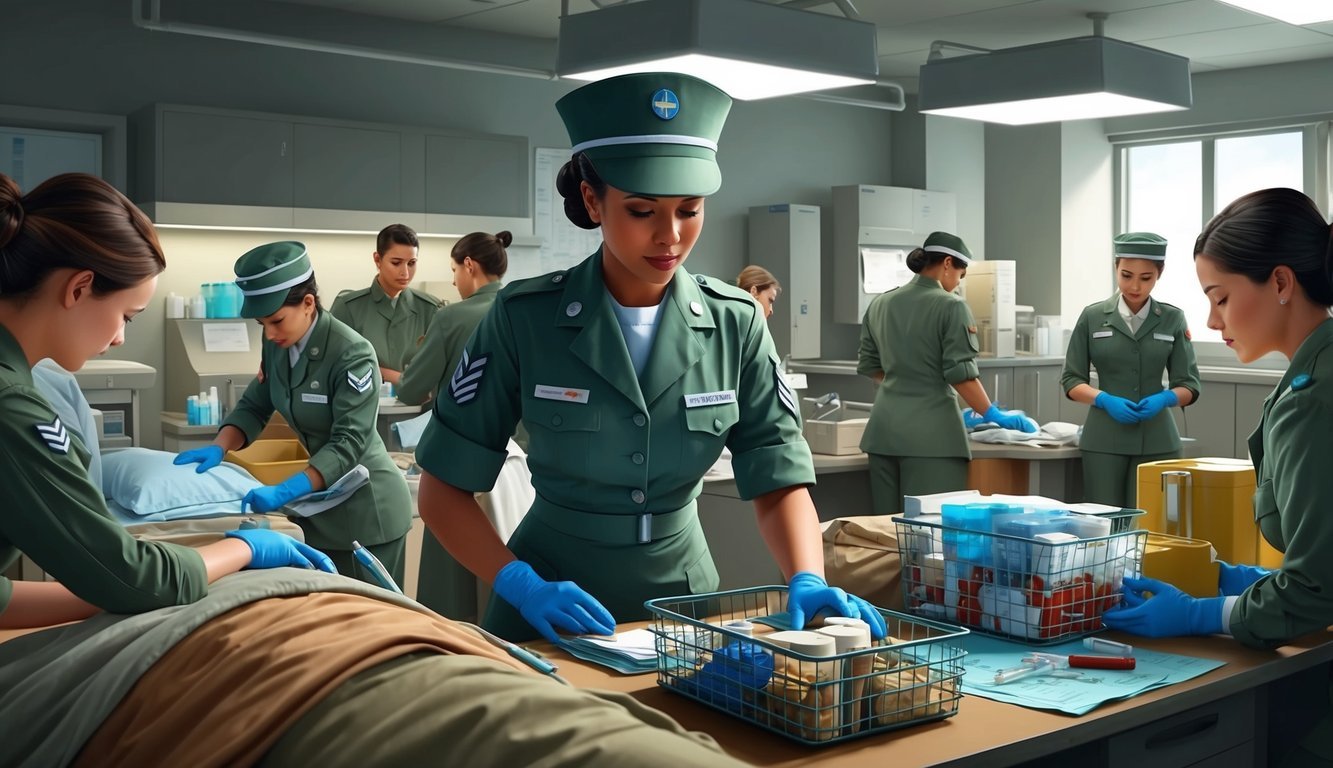Becoming a military nurse can be a rewarding career choice that offers not just a chance to serve your country, but also attractive financial benefits. The average salary for a military nurse is around $70,000 annually, but this can vary based on your education, rank, and any special certifications you hold.
With additional benefits like allowances, healthcare coverage, and retirement plans, the overall compensation often exceeds what many civilian nurses earn.
In addition to the salary, military nursing positions provide unique career advancement opportunities and experiences that can enhance your skills.
You’ll find that the work environment is both challenging and fulfilling, as it combines high levels of responsibility with the opportunity to make a difference in the lives of service members and their families.
Understanding the pay structure and incentives available in military nursing helps you gauge whether this career path aligns with your goals.
Exploring these aspects will provide a clearer picture of what to expect as you consider this rewarding profession.
Key Takeaways
- The average military nurse salary is approximately $70,000 per year.
- Military nurses enjoy various benefits that may exceed civilian roles.
- Career advancement opportunities are abundant in military nursing.
Understanding Military Nursing Roles
Military nursing offers a unique and challenging career path.
It encompasses various roles across different branches of the military, each with specific requirements and training programs to prepare you for service.
Types of Military Nurses
In the military, there are three main types of nurses depending on the branch of service.
These include:
-
Army Nurse: Primarily responsible for providing medical care in combat and non-combat situations. They work in various settings, including hospitals and field environments.
-
Navy Nurse Corps: They fulfill key roles on ships and at naval hospitals. Their work may involve caring for sailors, Marines, and their families.
-
Air Force Nurse: They focus on both hospital care and aeromedical evacuation, which involves moving patients by air.
Each type has unique duties but shares a commitment to patient care in challenging environments.
Requirements to Become a Military Nurse
To become a military nurse, you must meet certain qualifications:
- Education: A Bachelor of Science in Nursing (BSN) is required for most military nursing roles. This degree prepares you with the necessary knowledge and skills.
- Licensing: You need to pass the NCLEX-RN exam to become a licensed registered nurse (RN).
- Commissioning: You must apply for a commission as an officer in the military. This often includes background checks and interviews.
- Training: Candidates must complete officer training, which focuses on leadership and military protocols.
Meeting these requirements helps you succeed in the military healthcare environment.
Military Nurse Training and Certifications
Once you are accepted, military nurses undergo extensive training.
This can include:
- Basic Training: Here, you learn about military life, discipline, and teamwork.
- Advanced Clinical Training: This focuses on specialized nursing skills relevant to your branch.
You may also pursue certifications in areas like trauma nursing or critical care.
These can enhance your skills and improve career opportunities.
Overall, military nursing requires dedication and specific training, but it provides unique experiences and significant responsibilities.
Salary Structures and Incentives
Understanding the pay structure for military nurses is crucial as it includes base pay, special incentives, and additional benefits.
Each component plays a significant role in your overall compensation package.
Base Pay and Military Pay Grades
Military nurses are paid based on their rank and years of service, which determines their pay grade.
Typical entry-level ranks for nurses are Second Lieutenant (O-1) and First Lieutenant (O-2), with salaries increasing as you gain experience.
Here’s a look at typical base pay for military nurses:
| Pay Grade | Monthly Base Pay (2024) |
|---|---|
| Second Lieutenant (O-1) | $3,637 |
| First Lieutenant (O-2) | $4,012 |
| Captain (O-3) | $4,482 |
The average military nurse salary ranges from $67,236 to $176,500, depending on factors like branch of service, skill level, and location.
For more details, you can visit this comprehensive guide.
Special Pay and Bonuses
In addition to base pay, military nurses can earn special pay and bonuses.
This includes sign-on bonuses that can be significant, often reaching up to $30,000 depending on your specialty.
Retention bonuses are available for nurses who commit to staying in the service for an additional time.
For instance, Certified Registered Nurse Anesthetists (CRNAs) can earn up to $50,000 as part of their incentive pay.
This financial assistance aims to keep qualified nurses within the military system.
Benefits Beyond Salary
Military nurses enjoy various benefits that enhance their total compensation package.
These benefits include health insurance, retirement plans, and even student loan repayment programs.
Health insurance is comprehensive, covering various medical needs for you and your family.
Retirement plans help secure your future financially, offering options such as the Thrift Savings Plan (TSP).
Additionally, many military hospitals prioritize work-life balance, allowing for flexible schedules and ample time off.
These benefits add substantial value to your overall compensation as a military nurse.
For more information on special and incentive pays, visit the Special and Incentive Pay Index.
Career Advancement Opportunities
As a military nurse, there are numerous pathways to grow your career.
Specializing in a particular area, pursuing further education, and seeking promotions can significantly enhance your professional journey.
Specialization and Continuing Education
Specialization allows you to focus on specific nursing fields, such as trauma, pediatrics, or mental health.
This helps you become more proficient and increases your marketability.
By pursuing a Master of Science in Nursing (MSN), you gain advanced skills that open doors to specialized roles.
Many military nurses choose to focus on areas like Nurse Practitioner or Clinical Nurse Specialist.
Continuing education is vital.
Attending workshops, seminars, or online courses keeps your knowledge up-to-date.
Programs that offer certifications in specialized fields can also be beneficial.
Pursuing a nursing education beyond your BSN degree can lead to higher salaries and better job prospects.
Military Scholarships for Advanced Degrees
The military offers various scholarships for nurses wishing to further their education.
Programs like the Health Professions Scholarship Program (HPSP) can cover tuition for advanced degrees.
These scholarships often come with a service commitment, so it’s critical to understand the terms before applying.
The benefits far outweigh the costs, as they can significantly reduce your student debt.
Also, some branches offer specific grants for military nursing education, which may not require repayment.
Researching and applying for these scholarships is essential to advance your career without incurring substantial debt.
Leadership and Promotion
Career advancement in the military typically follows a structured path.
Achieving a higher rank often involves demonstrating leadership abilities and completing required training.
You may start as a Lieutenant and work towards becoming a Captain or Major.
Promotions come with increased responsibility, higher pay, and involvement in decision-making.
Participating in leadership training programs will enhance your skills.
Networking with senior officers and attending military workshops can help you gain important insights into leadership roles.
Staying proactive about your career development is essential.
Taking initiative can lead to valuable opportunities that shape your nursing career within the military.
Work Environment and Responsibilities

As a military nurse, your work environment can vary widely.
You’ll find yourself in both well-equipped military hospitals and challenging combat zones.
Your responsibilities will adapt based on the location and situation.
Military Hospitals and Clinics
In military hospitals and clinics, you provide essential medical care to active-duty personnel and their families.
These facilities often include services like emergency care, surgical units, and specialty clinics.
Your daily tasks may include:
- Assessing patient conditions
- Administering medications
- Coordinating health services
- Performing procedures
Military health systems often utilize advanced technology to ensure efficient care delivery.
You may also work with Veterans Affairs (V.A.) hospitals, ensuring seamless transitions from military to civilian care.
The environment can be fast-paced but is usually well-resourced for your needs.
Roles in Combat Zones and Humanitarian Missions
In combat zones, your responsibilities shift dramatically.
You may be part of a team providing emergency care and performing military triage in war zones.
This requires quick decision-making and adaptability.
Your roles can include:
- Administering trauma care
- Conducting field assessments
- Managing crisis situations
Humanitarian missions may also call on your skills.
You’ll likely provide medical support in disaster relief efforts.
This can involve setting up temporary clinics and offering emergency nursing in challenging conditions.
Your ability to work under pressure is vital in these environments.
Balancing Civilian and Military Duties
You often balance both your civilian nursing skills and military training.
Many military nurses have the chance to continue their education while serving.
This can enhance your qualifications and improve patient care outcomes.
Consider the following:
- Certification opportunities
- Additional responsibilities in non-combat roles
- Networking with civilian healthcare professionals
Maintaining this balance helps you grow professionally while serving your country.
The experience you gain in military nursing is invaluable and can lead to future career advancements in both military and civilian settings.
Comparative Analysis of Military vs. Civilian Nursing

When considering a career in nursing, understanding the differences between military and civilian roles is crucial.
This includes salary structures, the diversity of skills and career paths, as well as the cultural and operational environments that shape each role.
Salary Comparison
Salaries for military nurses and civilian nurses can vary significantly.
According to recent data, registered nurses in the civilian sector earn an average salary ranging from $60,000 to $95,000 annually.
In contrast, military nurses, such as those in the Army Nurse Corps or Navy Nurse Corps, have salaries that average between $67,236 and $70,430 per year.
| Type of Nurse | Average Salary |
|---|---|
| Civilian Registered Nurse | $60,000 – $95,000 |
| Army Nurse | $67,236 |
| Navy Nurse | $67,436 |
| Air Force Nurse | $70,430 |
Military nurses also receive additional benefits like housing allowances and healthcare coverage, which can enhance total compensation.
This may make military nursing attractive for those focused on long-term financial benefits.
Skillset and Career Path Diversification
Military nursing provides unique opportunities to develop specialized skills.
Trauma nursing is a prominent area in military settings due to exposure to combat and emergency situations.
You may also gain experience in various fields, such as critical care, emergency medicine, and mental health, which helps diversify your skill set.
Civilian nursing typically offers specialization options as well, but the training and experience can differ based on clinical settings and healthcare needs.
The structured advancement opportunities in the military can lead to rapid promotions, especially within the Nurse Corps, where leadership roles are available.
In civilian jobs, advancement can depend more on healthcare organization structures and available positions.
Cultural and Operational Differences
The culture within military nursing is distinct.
In military environments, you may adapt to a more hierarchical structure.
This can influence teamwork dynamics and decision-making processes.
In civilian nursing, the focus is often more patient-centered with a collaborative approach among various healthcare professionals.
The operational pace can also differ.
Military nurses may need to be prepared for rapid deployment and high-pressure scenarios, while civilian nurses might work in more stable environments.
This contrast in culture and operations shapes each nurse’s experience, making it essential to consider your preferences when choosing between military and civilian nursing careers.
Frequently Asked Questions
Understanding the salary of military nurses involves looking at various factors.
These include elements such as education, experience, branch of service, and deployment status.
Below are some common questions regarding military nurse salaries.
What factors influence the salary of a military nurse?
Several key factors influence your salary as a military nurse.
These include your rank, years of service, location, and specific branch of the military.
Additional certifications and specializations can also impact your earnings.
How does the pay for military nurses compare to civilian nurses?
Military nurses generally earn competitive salaries compared to civilian nurses.
The average salary for registered nurses (RNs) in the civilian sector is around $82,750 annually.
In contrast, military nurses’ salaries can vary from about $60,000 to over $95,000 depending on rank and experience.
What are the typical salary ranges for military nurses in different branches, such as the Air Force?
Military nurse salaries can differ significantly among branches.
For example, Air Force nurses can earn between $61,040 and $95,000 a year.
Army nurses may have similar starting salaries, ranging from around $67,236 to $176,500 based on their experience and specialty.
How does the salary for military nurses change with experience and rank?
As you gain experience and rank, your salary will likely increase.
Entry-level positions may start at around $60,000 to $70,000 annually.
With several years of experience and promotions, your salary can reach upwards of $176,500, depending on your qualifications and responsibilities.
What educational and certification requirements are needed for a military nurse?
To become a military nurse, you need a Bachelor of Science in Nursing (BSN) or equivalent degree.
Additionally, you must pass the NCLEX-RN exam to become a licensed registered nurse.
Specific branches may have additional certification or training requirements.
Are there special pay or benefits for military nurses deployed overseas?
Yes, military nurses deployed overseas often receive special pay and benefits.
These can include hazard pay, additional allowances for housing, and comprehensive healthcare coverage.
These benefits can enhance your total compensation while serving in combat or remote areas.

